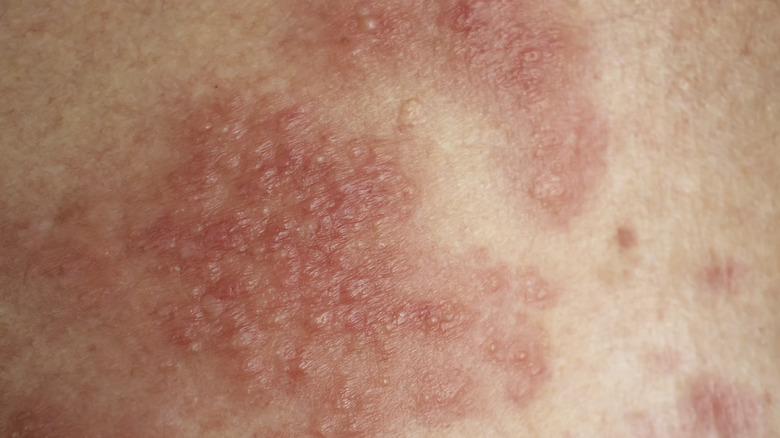Is Eczema Contagious?
Itchy, dry, irritated skin is a common experience for individuals who experience eczema, according to Mayo Clinic. The National Eczema Association notes that more than 31 million Americans experience some form of eczema.
Eczema is a term that refers to skin conditions in which the skin becomes irritated and often includes rashes, itching, and redness. Some forms of eczema can cause the skin to develop clusters of tiny blisters that are painful and sore. The National Eczema Association explains that there are seven different types of eczema.
Eczema typically begins to show in the earlier stages of childhood, sometimes even in infancy, according to WebMD. For most individuals, the symptoms and side effects associated with eczema have mostly disappeared by age 10.
For others, however, episodes referred to as "flare-ups" can occur across an individual's lifespan. Adult eczema most often develops in a person's 20s or 50s, according to the National Eczema Association.
Causes, symptoms, and triggers
While there has been a fair amount of research on the causes of eczema, doctors and researchers are still uncertain as to the specific reason that individuals experience these flare-ups. However, most researchers agree that there is a connection between the genes of an individual and their reaction to external or environmental triggers. The National Eczema Association explains that individuals with eczema typically have an overactive immune system.
The symptoms of eczema can include rashes, itchiness, oozing, and skin that is dry, cracked, crusty, thickened, or swollen. The skin can even become raw from continuous scratching (via Mayo Clinic). The symptoms of eczema can appear anywhere on the body.
Eczema flare-ups can be triggered by a number of different factors. Some of the common triggers for individuals with eczema include exposure to very dry air (whether hot or cold); scents in candles and perfumes; juices from fruit, vegetables, or meats; bath products; laundry detergents; household cleaners; and even stress (via National Eczema Association).
Is eczema contagious?
Individuals who regularly experience eczema flare-ups may be concerned about the potential of the skin condition being contagious. So is eczema contagious?
The short answer is no. Eczema cannot be transmitted from person to person through contact, as explained by the National Eczema Association. If the sight of someone experiencing an eczema flare-up has you wanting to claw at your own skin, your itch is most likely psychosomatic.
Treatment plans for eczema should be based on the individual and their specific symptoms. Eczema treatments can vary, but most typically focus on keeping the skin moisturized and reducing exposure to potential irritants (via Mayo Clinic).
Some individuals may require more intensive treatments, such as wet wrap therapy and medicated moisturizers prescribed by a physician, notes the National Eczema Association. Routine care is important to keep the skin from drying out, which increases the risk of experiencing a flare-up.



